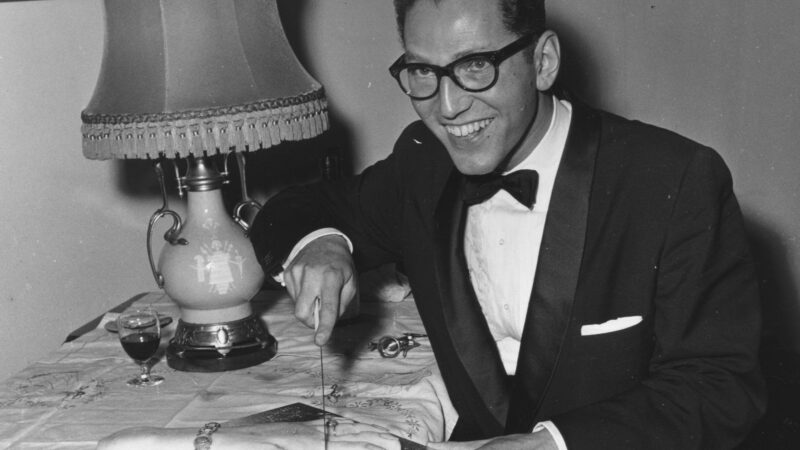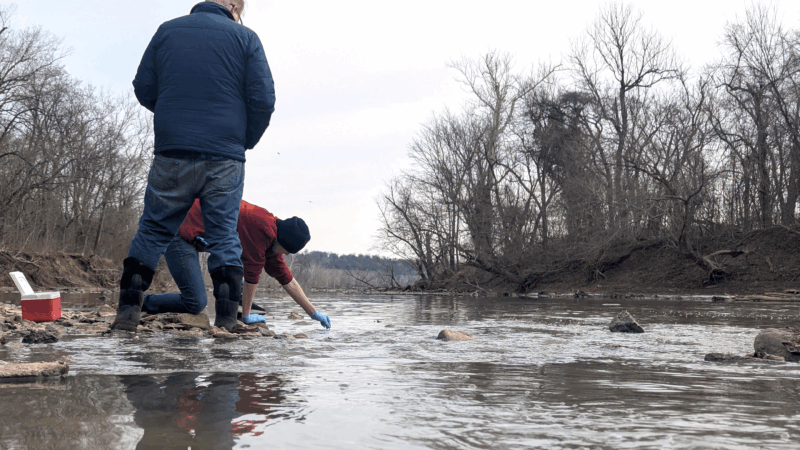Tom Lehrer, influential musical satirist, dies at 97
Tom Lehrer, a popular musical satirist who rose to fame in the 1950s and ’60s before returning to a career teaching math, has died at age 97.
Lehrer died on Saturday at his home in Cambridge, Mass., his friend David Herder confirmed to NPR.
He was remembered across the entertainment industry on Sunday, including by “Weird Al” Yankovic, who called Lehrer a “living musical hero” in a social media post on Sunday.
When Lehrer wasn’t teaching college-level math, he was sitting at a piano making people laugh — and worry — about the world. His targets included politics, nuclear destruction, and even social harmony.
“I could never sit down and say, ‘Today, I will write a funny song,'” he told NPR in 1997.
Born in 1928, he was raised in New York City’s Upper East Side, according to a 1981 Harvard Crimson profile, where he took piano lessons as a child. He attended Horace Mann High School before going to Harvard, where he wrote “Fight Fiercely Harvard,” his first recorded song, which he wrote at 17 years old.
His records spread well beyond campus to become an underground sensation in the 1950s. In the mid-1960s, NBC aired a satirical show called That Was The Week That Was. Producers turned to Lehrer for material. Although cast members sang his songs, Lehrer later performed and recorded them for intentional distribution.
“He established this genre of comedy songwriting,” said Rachel Bloom, a musical satirist and star of the CW TV show Crazy Ex-Girlfriend. Although she’s several generations younger, Bloom says she learned a lot from Lehrer’s work. “When you’re doing comedy songs, you want to take established genres and flip them on their head,” she said. “It’s almost like you want to go opposite.”
When Tom Lehrer wanted to ridicule and attack something, he did it from the inside. He would falsely embrace what he detested.
Take his song “The Vatican Rag.” It was for Lehrer a logical extension of the ecumenical council in Rome in the 1960s known as Vatican Two. Lehrer’s tune suggested that the best way for the Vatican to sell a product in this secular age would be to redo some of the liturgical music in popular song forms.
Lehrer may have been a Jewish kid from Manhattan, but he knew his catechism. Like all his work, “The Vatican Rag” was subversive and funny. And Lehrer could be ahead of his time. Even before the public had fully engaged on environmental damage, he wrote this: “Pollution, pollution, they got smog and sewage and mud. Turn on your tap and get hot and cold running crud.”
He retired from public performances in the 1970s and focused on teaching. He taught for many years at the University of California, Santa Cruz, splitting his time between there and Cambridge.
“I used to laugh more. Now I get angry,” he told NPR in 1997. “And it’s very hard to be satiric and — or to be funny, let’s say — and angry at the same time.”
NPR’s Chandelis Duster and James Doubek contributed to this report.
What I learned watching every sport at the Winter Olympics
Sit down with pop culture critic Linda Holmes as she watches the 2026 Winter Games. She is exhausted by cross-country, says "ow ow ow" during moguls, and makes the case, once and for all, for curling.
Scientists worry about lasting damage from Potomac sewage spill
Drinking water around the District of Columbia hasn't been contaminated. But scientists say the environmental damage could be severe.
Using saliva to detect disease holds promise, but it’s not perfected yet
Easier than a blood test, saliva tests have the potential to detect cavities, infections and even cancer. But a lack of insurance coverage and other obstacles stand in the way of wider use.
What worked and what didn’t with a cellphone ban at a Kentucky school
Keeping students off their devices is the new norm in many schools. We talked to students and educators at one Kentucky school to see how it's working.
Israeli settlers kill 19-year-old Palestinian American, officials and witnesses say
Israeli settlers in the occupied West Bank shot and killed a Palestinian American man during an attack on a village, the Palestinian Health Ministry said.
Trump says he doesn’t know if aliens are real but directs government to release files on UFOs
President Donald Trump said Thursday that he's directing the Pentagon and other government agencies to release files related to extraterrestrials and UFOs because of "tremendous interest."








